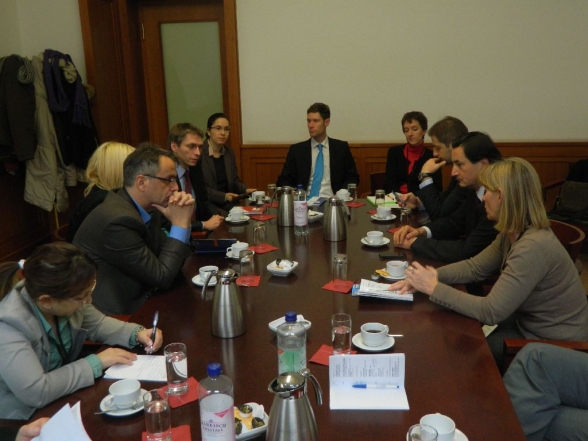In the organisation of German foundation Konrad Adenauer Stiftung (KAS), MPs and staff of the Parliament of Montenegro, in the period 2-6 December 2013, paid a study visit to Berlin, during which several meeting were held in the Parliament of Germany, Office of the Federal Chancellor, Ministry of Foreign Affairs as well as with representatives of the Christian Democratic Union (CDU).
During the meeting in the Parliament of Germany, the division of competences in the legislative power was presented with regard to federal system of the state, where the possibility of blocking the reaching of decisions was emphasised since the parliament was bicameral, but it happened rarely in practise, since the need of MPs for reaching the consensus has been growing. A special attention was paid to the role of the parliament in terms of creating the foreign policy, in the process of considering issues related to EU policy, including issues of EU enlargement. On that occasion, the role of the Parliament of Montenegro was positively assessed, with a reference that it had to be additionally strengthened through control mechanisms available to Montenegrin Parliament. Montenegrin Delegation had an opportunity to get acquainted with a slightly different principles of functioning of the German Parliament, reflected, inter alia, in the manner of voting in plenary, fact that meetings of working bodies were closed to public and the participation in the process of preparation of a law. It was jointly assessed that it was necessary to improve the cooperation between the two parliaments, through direct contact of working bodies and within parliamentary friendship groups.
During the meetings in the Office of the Federal Chancellor and Ministry of Foreign Affairs of Germany, it was stated that the new approach in the negotiation process with the EU resulted from the wish of member states to improve additionally negotiations on membership. Presenting the relationship of Germany to the Western Balkans, officials in Berlin said that they were following critically and constructively the process of European and Euro Atlantic integration, praising on that occasion the previous course of negotiations of Montenegro, and emphasising the need of adapting to the fact that apart from technical there was a political part of negotiations, which includes the serious reporting on reforms, lobbying and permanent contact with member states. Even though the strategic advantage of Montenegro in relation to the countries of the region lies in the fact that there is a complete consensus on European integration in the Parliament, it is necessary to take advantage of the synergy of all the constituents of society, in order adequately to overcome the challenges in the fields of economy, agriculture and ecology and negotiation chapters 23 and 24.
During the meeting with the representatives of political fraction – CDU, i.e. MP Group CDU/CSU, the recent election campaign was presented, during which traditional but also some new modern instruments were used, related to, primarily, social networks and adequate coverage of internet space. The work and structure of the MP Group were presented, with an emphasis of the significant role of those in the work of the Parliament; the MP Group meets regularly, with the participation of the Federal Chancellor and ministers - members of the MP Group; during the meetings current home and foreign policy are discussed basically, i.e. proposals for regulations that are under the procedure or it is expected that they would be soon. The fact that German citizens are quite distant from the decision of Brussels is indicated as a particular problem, especially reflected in the weak interest of the citizens to vote for the European Parliament.
During the five-day intensive programme, MPs Predrag Sekulić, Snežana Jonica, Damir Šehović and Goran Danilović as well as five employees of the Parliament also met the Ambassador of Montenegro to Germany, H.E. Vera Joličić-Kuliš, representative of the German Foreign Policy Centre and the provincial parliament of Brandenburg.









